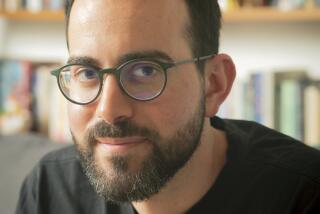BOOK REVIEW : A Novel of Ideas Is Cloaked as Comedy : RAMEAU’S NIECE by Cathleen Schine Ticknor & Fields: $19.95; 288 pages
- Share via
The truth--and that word, truth, carries a high charge in this novel--comes out toward the end of “Rameau’s Niece,” when Margaret Nathan and her new Belgian friend, Martin, are on their way to lunch.
“You have so many opinion (sic), Marguerite,” says Martin, who first heard Margaret’s name when she was in Prague giving a lecture on a dim corner of French philosophy. “You have opinion on traffic lights!” The reader can almost feel the hopelessness in Margaret’s voice when she replies, “I don’t want to have opinion. I want to have judgment.”
Opinion, judgment, truth, perception, doubt, faith--”Rameau’s Niece” is a novel of ideas dressed up as a Manhattan marital comedy, or as author Cathleen Schine describes the book, “a comedy of remarriage.”
It’s a witty volume, deceptively so; the undercurrents--as Margaret’s comment makes clear--are serious, dealing with the tricky contours of identity and authenticity. Margaret is something of a celebrity, having published to acclaim her thesis on an obscure French woman’s proto-feminist, Enlightenment-era tract on human anatomy; yet Margaret seems unable to enjoy success.
“Who cares?” she thought upon reading a front-page rave of “The Anatomy of Madame de Montigny” in the New York Times Book Review. “No one else could possibly care.”
Margaret is interested in the Enlightenment because she’s interested in enlightenment--in knowing why she is socially inept, why her perceptions about everything (besides the written word) are routinely wide of the mark.
Those problems are greatly exacerbated by the fact that her husband, a professor of comparative literature at Columbia, is a charming and brilliant Englishman: if Edward shines like the sun, thinks Margaret, she shines like “a battery-operated flashlight, swinging this way and that.”
In the early stages of the book, Margaret sees Edward in heroic terms, but eventually Martin tells Margaret, in a dream, that she suffers from nonage: “the inability to use one’s own understanding without another’s guidance.”
Margaret doesn’t understand the nature of her dilemma until she has embarked on her second book, a study of underground Enlightenment literature that focuses on a plagiarized pastiche of philosophy called “Rameau’s Niece.”
A dialogue between a philosopher/narrator and a beautiful, intelligent young woman (the fictional sister of the young man in Denis Diderot’s “Rameau’s Nephew”), it begins with the philosopher playing the role of wise teacher and the young woman that of ardent pupil.
The dialogue isn’t always Socratic, however; it’s soon evident that the ideas discussed shadow the curious couple’s sensual exertions. The philosopher explains that one must necessarily compare big with little, for example, in order to sense the meaning of either concept, but he isn’t describing only that when he says Rameau’s niece “sought to complement her contemplation of the big and little stick by seeking a more direct and empirical approach, and sensations did indeed begin to occur with remarkable rapidity and diversity.”
Schine, author of “Alice in Bed” and “To the Birdhouse,” doesn’t need to telegraph the connection between Margaret’s fascination with “Rameau’s Niece” and her own socio-sexual awakening. Margaret doesn’t make the connection, at least consciously. All she knows is that Edward is suddenly unbearable, that she wants to break away from him--just as Rameau’s niece does from her teacher.
Margaret travels alone to Europe, for one thing, and there discovers what she believes to be her true self; unfortunately, it is one that seems to be “a sexually hysterical, xenophobic, middle-aged Midwesterner from the 1930s.” Edward, she realizes, “engulfed the world” and Margaret with it, leaving her “swept up in the wave, the nirvanic swoon of living someone else’s life.”
Stateside again, Margaret attempts to experience more of the world by developing new relationships with a number of people--Martin; her editor, Richard; a dentist; a few women friends from college. These ventures don’t prove particularly fruitful, however, for Margaret finds herself feeling jealousy, confusion, resentment and one very bad blackout-cum-hangover.
Great, she thinks; she’s left her husband, alienated a number of old friends and successfully transformed herself from “happy, scholarly housewife” to “frustrated adulteress wandering the streets, seeking shelter in shoe stores” and perhaps becoming a lesbian.
“Rameau’s Niece” doesn’t end there, of course, for it wouldn’t be a comic novel if Margaret’s misunderstandings weren’t eventually cleared up. By the book’s close, Margaret resembles Dorothy in Oz, had Dorothy been an intellectual.
The final passage in “Rameau’s Niece”--also the final passage, apparently, in “Rameau’s Nephew”--says, in effect, there is no place like home: “If you think carefully about it,” writes the philosopher, “you will agree that in the end our truest opinions are not the ones we have never changed, but those to which we have most often returned.”
Margaret hasn’t exactly achieved enlightenment in the course of this book, but she has learned something of great importance nonetheless--that the mind can delude as much as illuminate.
Schine, with “Rameau’s Niece,” hasn’t quite entered the same league as David Lodge, the English writer whose academic novels are becoming modern classics, but she is sure to give him formidable competition if more Margaret Nathan novels lie in her future.
More to Read
Sign up for our Book Club newsletter
Get the latest news, events and more from the Los Angeles Times Book Club, and help us get L.A. reading and talking.
You may occasionally receive promotional content from the Los Angeles Times.









